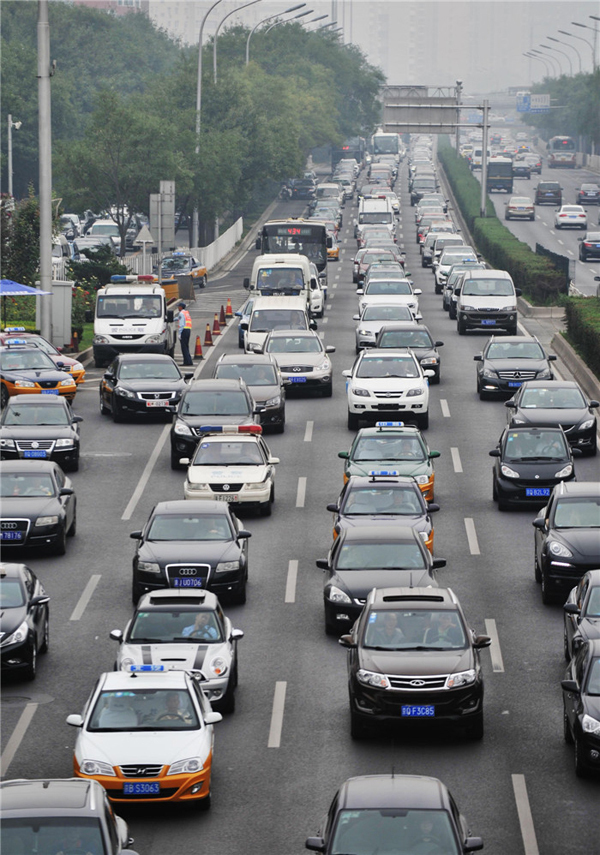Subsidies for travel to curb vehicle costs
China Daily, January 5, 2015 Adjust font size:

|
Tightly packed vehicles creep along streets near Liujiayao Bridge, Third Ring Road South of Beijing, on Sept 22, 2014. Beijing is among the cities that have car purchase restrictions. [Photo/Xinhua] |
A new guideline to rein in vehicle expenses for the central government is causing many officials to rethink their commutes.
Instead of having cars provided by the government, officials at bureau level will receive monthly traffic subsidies of 1,300 yuan ($209), while those at director level and section level will get 800 yuan and 500 yuan a month, according to the guideline that took effect at the beginning of the year.
With the subsidy, an official at bureau level could travel 13 times by taxi from Beijing Capital International Airport to Guomao, one of Beijing's busiest areas.
"I knew about the guideline and heard that the traffic subsidies had been enforced," said an official from a central government department that was part of a pilot project. "Maybe the money will be given out gradually. I haven't received any so far."
The official, who declined to be named, told China Daily that all vehicles in her department paid for with public funds were taken back about two months ago, "and we were asked to think of ways to solve the traffic problem," said the 37-year-old, who goes to work by bus.
"I will receive 800 yuan a month under the guideline," she said, adding that public funds have been used strictly since the guideline came into effect.
The measures will later be extended to local administrations.
According to another official in Hegang, Heilongjiang province, the plan for traffic subsidies in his working area may be issued by the end of this year.
"More time is needed to extend the reform in local government departments, because the traffic conditions in each area are different," said the official, who declined to be named.
"Although I don't know how much money I can get under the reform, I'm looking forward to seeing our local plan and receiving the subsidies," he added.
The reform has also cut into the workload of some drivers in government departments, according to Xinhua News Agency, adding that the problem of officials using government cars for private matters has also been alleviated.
Yang Xiaojun, a law professor at the Chinese Academy of Governance, spoke highly of the reform, saying it can help fight corruption and save public money.
It is hard to make specific plans for local government departments, especially those at county level, Yang said.
But Lin Zhe, a professor of anti-corruption studies at the Central Party School, said the subsidies may not be effective in rooting out abuse of vehicle privileges and saving public money.
"It's better to solve the problem by posting information online about government vehicles — such as how a government car is used and who uses it — to put it under public supervision," Lin said.
Shenzhen restricts car purchases to ease congestion
Authorities in Shenzhen announced a car purchasing restriction requiring prospective buyers to acquire new car plates by lottery or auction on Monday.
Starting from 6 pm Dec 29, 100,000 new vehicle plates will be allocated annually for the city, including 20,000 electric cars, said Chen Huigang, deputy director of the city's traffic and transport commission.
The number may be adjusted later based on road capacity and air pollution, Chen said.
Half of the plates will be distributed through lottery and the other half by auction, he said.
In the future, the auction may be connected with carbon emission trading, he said, not offering any details.
Xu Wei, deputy head of traffic police bureau of the city, said vehicles with non-Shenzhen plates will be forbidden during rush hours on weekdays if they are not from Hong Kong or Macao.
The number of vehicles in Shenzhen exceeded 3 million by September.
Shenzhen, in South China's Guangdong province, is the eighth city to adopt purchase restrictions following Beijing, Shanghai, Guangzhou, Tianjin, Guiyang, Shijiazhuang and Hangzhou, as traffic congestion has become a common headache for residents in many Chinese cities.

